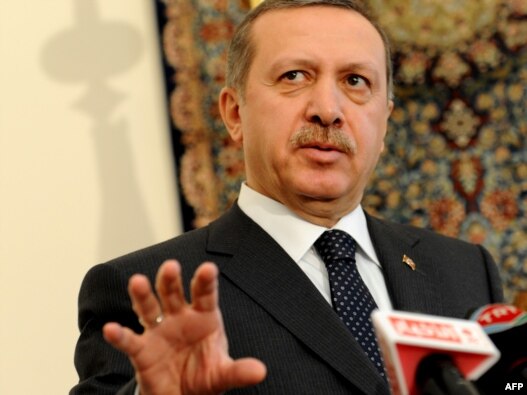 Saudi Arabia — Turkish Prime Minister Recep Tayyip Erdogan speaks during a press conference in Jeddah, 20Jan2010
Saudi Arabia — Turkish Prime Minister Recep Tayyip Erdogan speaks during a press conference in Jeddah, 20Jan2010
“I received an invitation five, six months ago, to attend an international event that other countries will also be attending and serves a good cause, to prevent the use and spreading of nuclear weapons. I will be going to the United States,” Erdogan told journalists. “My ambassador Namik Tan will be going back to Washington before my visit,” he said.
Armenian President Serzh Sarkisian will also take part in the summit. U.S. Secretary of State Hillary Clinton invited him to Washington during a telephone call on March 12 that appeared to have centered on Armenia’s stalled rapprochement with Turkey.
Clinton phoned Sarkisian the day after he suggested that Turkey will not unconditionally normalize relations with Armenia anytime soon and again threatened to annul the U.S.-brokered protocols signed by the two nations in October. Some observers say the Obama administration will use the Washington forum for a last-ditch attempt to salvage the agreements.
It is not yet clear whether the U.S. president will meet Sarkisian and Erdogan on the sidelines of the summit. A spokesman for Sarkisian told RFE/RL’s Armenian service earlier this week that the Armenian leader may hold meetings with “various participants” of the two-day gathering. A senior member of the ruling Republican Party of Armenia (HHK) said on Friday that a meeting between Sarkisian and Erdogan is “very possible.”
Ankara recalled its ambassador to Washington immediately after Foreign Affairs Committee of the U.S. House of Representatives narrowly approved on March 4 a resolution urging Obama to “accurately characterize the systematic and deliberate annihilation of 1,500,000 Armenians as genocide.”
In a telephone call with Turkish Foreign Minister Ahmet Davutoglu last Sunday, Clinton assured Turkey that the White House opposes further progress of the congressional resolution. It is uncertain whether the resolution will go to a vote of the full House of Representatives or whether it could pass.
AFP news agency quoted Davutoglu as saying on Thursday that Washington has conveyed “increasing messages easing our concerns and meeting our expectations … and [showing] that the strategic dimension of Turkish-U.S. relations is being understood.”
Erdogan likewise spoke of “positive developments” in Turkish-American contacts. “I hope these positive developments will continue also in April,” he said.
It was an apparent reference to Obama’s statement due on the April 24 anniversary of the start of mass killings and deportations of Armenians in the Ottoman Empire. Ankara hopes that Obama will again refrain from using the word “genocide” to describe the events of 1915-1918.
The United States is keen to smooth over relations with Turkey, NATO’s only Muslim member, and a key ally in trouble spots from Afghanistan to the Middle East. Washington is seeking to convince Turkey, a non-permanent member of the Security Council, to support a fourth round of U.N. economic sanctions against Iran over its nuclear program, while Erdogan has spoken against the use of sanctions.
